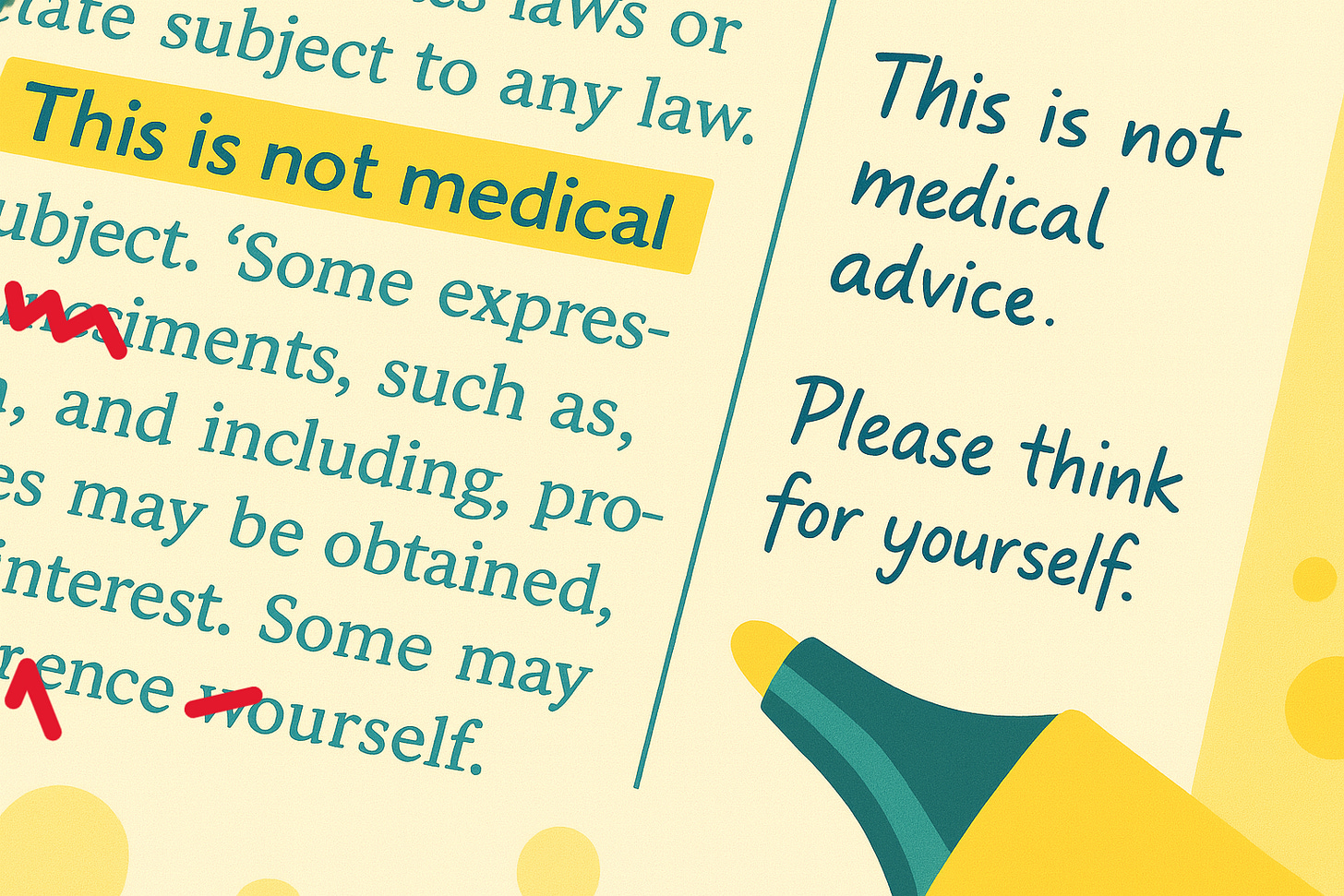Disclaimer(s)
Please, stay curious...
1. How this started
The health-related content on Domo Futu reflects my personal experience, years of reading, and a long-standing interest in health, performance, and longevity. That interest began when I was about twelve, with two books: Eat to Win: The Sports Nutrition Bible by Robert Haas (the first new book I ever bought) and a second-hand copy of Life Extension: A Practical Scientific Approach by Durk Pearson and Sandy Shaw from a local thrift store. Those books filled many hours and set me on a path I am still walking.
Haas argued that “eating excess protein (above 80 grams each day in most cases) can clearly hamper athletic performance and endurance through dehydration and essential mineral losses.” Modern research, especially for older adults, now often points the other way: higher protein intake is frequently recommended to maintain muscle and function into later life.
Pearson and Shaw were enthusiastic about taking very large daily doses of vitamin E to strengthen the immune system and guard against infections and cancer. Later evidence has linked high-dose vitamin E to increased mortality and a higher risk of some cancers.
The lesson I took from watching that advice flip over time is simple: health guidance changes, sometimes dramatically. No single book, study, or website should be the end of your learning.
Paul Graham makes a similar point about the broader culture of belief:
“At every period of history people have believed things that were just ridiculous and believed them so strongly that you risked ostracism or even violence by saying otherwise. If our own time were any different, that would be remarkable. As far as I can tell, it isn’t.”
Because of this, I use a personal framework I call the Evidence-Based Truth Claim Scale (ETCS) when I think about (especially health-related) claims. It runs from 0 to 100 and takes into account things like study design, replication, expert consensus, and how well the claim stands up to attempts at falsification.
2. What Domo Futu is (and is not)
Domo Futu is a space where I think in public about health, learning, performance, systems, and culture. I write as a curious person who works as a psychologist and educator, not as your psychologist or your educator.
Nothing here is medical advice or psychological treatment.
Nothing here creates a therapeutic relationship or any other professional relationship.
If you are considering changes to your diet, supplements, training, medication, or broader health strategy, please talk with qualified health professionals first, especially if you have a diagnosed condition or are taking medication. The content here is not intended to diagnose, treat, cure, or prevent any disease. Your decisions should be made carefully, in light of your own situation and in consultation with people you trust.
3. Personal capacity, money, and links
I write in a personal capacity. Nothing here represents the official views of my current employer, any past employer, or any organization I am associated with.
Some links I share are affiliate or referral links. If you decide to buy something after clicking one of those links, I may receive a financial benefit at no extra cost to you. I only recommend products or services that I personally use and find valuable (no exceptions), and I would make the same recommendations if there were no affiliate programs at all.
If there is ever a post where the financial relationship needs more explanation, I will note that clearly in the post itself.
4. Culture and perspective
I grew up in the United States and now live in Australia. For a long time I did not think of myself as particularly “American.” Living in another country has made some of those defaults easier to see.
I notice reactions, assumptions, and preferences that seem to come from that cultural background, even when I did not consciously choose them. My perspective is shaped by that mix of American upbringing and Australian context, and it is almost certainly skewed in ways I do not fully see. I try to notice and adjust for this, but I will not always manage it.
5. Search, sources, and algorithms
When I write, I sometimes use Google and other search tools to look up papers, books, statistics, and definitions. This means that the material I start from is influenced by corporate incentives, search algorithms, and the institutions those systems tend to surface first.
To reduce the effects of that, I try to:
look past the first page of results
trace important claims back to primary or high-quality sources where possible
cross-check numbers and arguments against more than one reference
Even with these habits, links and citations in Domo Futu should be treated as starting points for your own reading, not as the last word.
6. AI assistance
I sometimes use generative AI tools as part of my writing process. In terms used by regulators, this sits in the AI-assisted / AI-enhanced part of the spectrum, not in “fully AI-generated” territory.
In practice, that looks like:
drafting ideas and arguments myself
asking an AI system to help with clarity, structure, or alternative phrasings
occasionally using AI to help check whether something is unclear or incomplete
keeping full editorial control over what finally goes to press
I do not publish posts that are wholly machine-written. If a particular piece relies on AI more heavily than usual, I will say so. Any errors or odd leaps of logic are ultimately mine.
7. Fallibility and reader responsibility
Everything on Domo Futu is a work in progress. I expect some of it to be wrong, some of it to go out of date, and some of it to change as I learn more. Old posts may not reflect my current views.
You are responsible for how you use anything you read here. Please treat Domo Futu as one input among many when you make decisions about your health, learning, or life.
If you notice a factual error or a serious omission, I welcome thoughtful corrections and disagreements. They are part of how this project improves over time.
Finally, thank you to my wife, who first suggested writing a disclaimer while she was in law school and helped keep me on the sensible side of risk.



